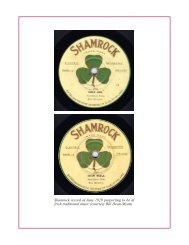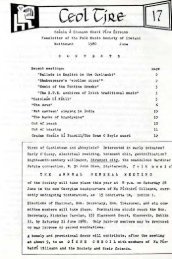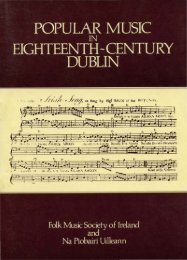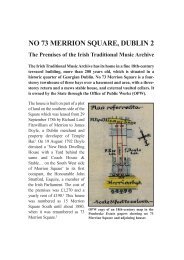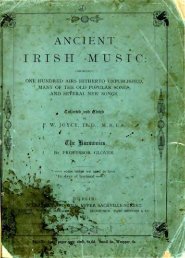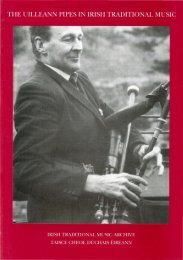Union Pipes - Irish Traditional Music Archive
Union Pipes - Irish Traditional Music Archive
Union Pipes - Irish Traditional Music Archive
Create successful ePaper yourself
Turn your PDF publications into a flip-book with our unique Google optimized e-Paper software.
7 COURTNEY’S ‘UNION PIPES’ AND THE TERMINOLOGY OF IRISH BELLOWS-BLOWN BAGPIPES<br />
Although the venue and the occasion are English, as will be seen<br />
below the piper is <strong>Irish</strong> and his pipes are <strong>Irish</strong> pipes, and, insofar as it<br />
was introduced by him, the term is also <strong>Irish</strong>.<br />
‘Mr. Courtenay’ was the stage name of the professional bellows<br />
piper Denis Courtney, an ‘itinerant <strong>Irish</strong> musician of great fame in<br />
the British provinces’. 12 He was about twenty-eight when he made<br />
his first London concert appearance on 14 May 1788, in the<br />
company of other very different but well known performers and in<br />
what was a leading London music venue. Courtney’s piping quickly<br />
became famous in London and he had a somewhat meteoric career<br />
before he died there in 1794, in his mid-thirties, of an illness brought<br />
on by heavy drinking. Long after his death, he was remembered as<br />
an outstanding musician.<br />
Before Courtney’s debut, no bagpiper of any kind is known to have<br />
given a stage recital in London, as distinct from performances in the<br />
street and in taverns and ballrooms, from the accompanying of<br />
dancers on stage, and from private recitals. Bagpipes had long been<br />
generally spoken of in print in Britain, usually in unflattering terms,<br />
and in their Scottish forms used to make oblique criticisms of<br />
Scottish politicians at Westminster. They were bywords for riot, 13<br />
drunkenness, low living and noise. Nor were <strong>Irish</strong> pipes exempt from<br />
this latter criticism. The Scottish novelist Tobias Smollet compared<br />
the piercing singing of a character in his 1751 London novel The<br />
Adventures of Peregrine Pickle to ‘the joint issue of an <strong>Irish</strong> bagpipe<br />
and a sow gelder’s horn’; this quip was reproduced over and<br />
over in contemporary newspapers and magazines. Nevertheless there<br />
is occasional print evidence of a positive bagpipe subculture in the<br />
12<br />
Highfill et al.: 4, 8.<br />
13<br />
The Scottish bagpipes had recently been used in London to lead mobs<br />
participating in the highly destructive anti-Catholic Gordon riots of the summer<br />
of 1780 (Morning Post and Daily Advertiser, London, 5 Jan. 1781).



